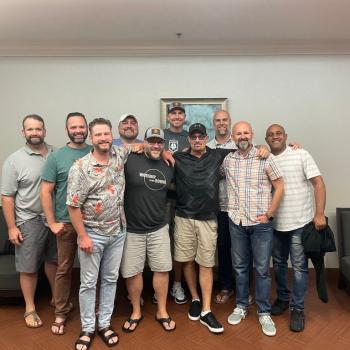I met Don Atkin several years ago in Charlotte, North Carolina. He graciously invited me to speak at one of his annual events.
Since then, I’ve become good friends with a number of the people whom he has mentored. And they speak very highly of Don and the influence he’s had on their lives.
Don has written a new book with an interesting title — Apostolicity.
In fact, I asked him about the title in this interview . . . it’s the very first question.
Enjoy the interview.
To view all of Don’s books, go here.
In your book, you use the term “apostles,” “apostolicity,” and “dominion.” Most of my readers don’t like the word “apostle” because it is has been so misused and tortured that the word always must be defined before someone can use it. Plus it’s been attached to so many movements that have redefined the term from what it meant in the New Testament. For this reason I myself don’t use it. “Dominion” is another word that has strong associations with a movement that went off the rails back in the 1980s within charismatic circles. So from the title itself, some of my readers may be turned off. So how are you using these terms in your book?
Don Atkin: Apostolicity: Having to do with things apostolic; matters concerning apostles. It is about apostolicity filling the earth through an incarnational and missional people. Jesus is the demonstration, the pattern and the example of true apostolicity.
Apostles: In biblical language apostles are those who have been sent out to perform a task in the name of another. They are endowed with the authority and freedom to act authentically on behalf of the one who sent them. That authority is a heavenly endowment that loves and leads by example.
Dominion: “Dominion is the fruit of the Father manifesting through the lives of His sons who make up the priesthood of all believers. The law of the kingdom is the nature of the King. The King is God, and God is love.”
One of the endorsers made this observation: “Don has a unique way to ‘reform’ language that has otherwise been overused and misapplied by applying fresh exegetical and biblical definition and perspective that is useful and edifying to the church.”
Interesting. I view apostolic workers as those who are sent specifically to plant local assemblies (corporate expressions of Christ). However, I know some writers like yourself use the term more broadly. Tell us a bit about the experiences that shaped the insights in the book.
Don Atkin: I received a clear call while in prayer in 1967. Subsequently, in 1968, I was sent out with the laying on of hands by the elders with the confirmation of the congregation. At that time I didn’t know how to spell “apostle.” My earliest years were filled with evangelism, hundreds coming to Christ during the charismatic and Jesus movements. By mid-seventies it was all about discipleship. It was in that season that some began to refer to me as an apostle when trying to describe what we were about. We endured the initial negative reactions to this new idea. Some years later I became part of an apostolic network and eventually led my own network. Fifteen years ago, in obedience to new insights I eliminated all institutional trappings, released people from the expectation of their titles, and fully embraced servitude as the higher way of dominion.
How is your book different from the many other books that are about “apostles” and “dominion” put out by charismatic writers?
Don Atkin: The simplest response would be to contrast Gentile authority with authentic spiritual authority that is awaiting expression in every individual in the new creation. “Christ in us, the hope of glory,” is assurance that each of us has a role among the priesthood of all believers, and the authority to fulfill our roles. We are to accordingly submit to the Christ in one another.
Amen. Give us two or three insights from the book that would be helpful to Christians.
Don Atkin:
- Every believer is intended to play a significant role among the priesthood of believers. It is God’s intention for all believers to be equipped for the work of the ministry.
- While not all believers are apostles, all are to be apostolic. The primary role of apostles is to equip the church to be apostolic—sent to fill the earth with God’s glory.
- In the eyes and intent of God there is one church in each city or region. The church divided cannot stand, much less pull down principalities and tear down strongholds that hold cities and regions in bondage.
What do you hope readers will walk away with after they finish your book?
Don Atkin: Allow me to quote Dr. Tony Dale:
“Two chapters stood out to me as models of simplicity and clarity. ‘Dominion Now’ gives as clear and as balanced a description as I have read of the challenge and clarion call of scripture to move towards that place where people can see that ‘the meek will inherit the earth.’ ‘Apostolic Genius: The Second Incarnation’ provides a simple understanding of the power of Christ in you, the hope of glory. For me those two short chapters alone provided enough to make the book worth reading.”














